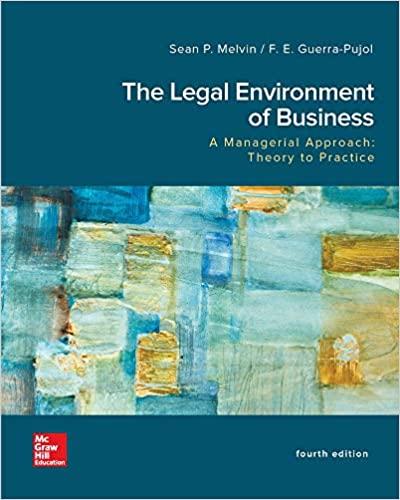Question
Assessment Questions 1. The literal translation of the rule nemodat quad non habet is that no one can give what he has. However, there are
Assessment Questions
1. The literal translation of the rule nemodat quad non habet is that no one can give what he has. However, there are exceptions to this rule
Discuss the exemptions of this rule.
2.In relation to a contract of sale of goods
Outline four categories of unascertained goods
High light the rules that govern delivery of goods.
3. On 31st dec 2012, smith appointed Aggrey mchuzi as his money-lending agent. In Jan 2013, Aggrey without smith's authority advanced sh.100,000 to jimmy without disclosing to jimmy that lie was sm ith's agent. Jimmy has since refused to refund the money advanced to him.
Analyses the legal principles applicable in the above case and advise smith, Aggrey and jimmy on their liability.
4. Discuss four duties of a seller under cost, insurance and freight CiF contract.
5.Explain two ways through which the sellers right of stoppage in transit could be exercised
6.Explain the rules governing the passing of risk in a sale of goods contract
Highlight the circumstances under which an agent would be allowed to delegate his authority
An agent will usually act within his authority, but if the relationship with his principal is well
established, he may occasionally act outside the authority if he feels the principal will subsequently ratify the agent's action.
Discuss the effects of subsequent.
7. Laws are amended by the national assembly so that humans can abide by them since they uphold its etiquette towards the society and in its way of earning a living. In relation to so, list the consequences of breach of rules of conduct.
8. Law of property is concerned with factors affecting land and property at large therefore the use and ownership of property is guided upon and evident in the constitution. Outline six common servitudes under the law of property.
9. Presentation for payment is essential for all bills. If a bill is not presented, the drawer and endorser are discharged but the acceptor is not discharged. Presentment must therefore be done at the proper place. Discuss the rules for determining the proper place for purposes of presentment.
10. A banker is an important person in the negotiable instruments since he deals with cheques. Summarize the circumstances under which the authority of the banker to pay a cheque drawn on him by a customer is terminated.
Step by Step Solution
There are 3 Steps involved in it
Step: 1

Get Instant Access to Expert-Tailored Solutions
See step-by-step solutions with expert insights and AI powered tools for academic success
Step: 2

Step: 3

Ace Your Homework with AI
Get the answers you need in no time with our AI-driven, step-by-step assistance
Get Started


